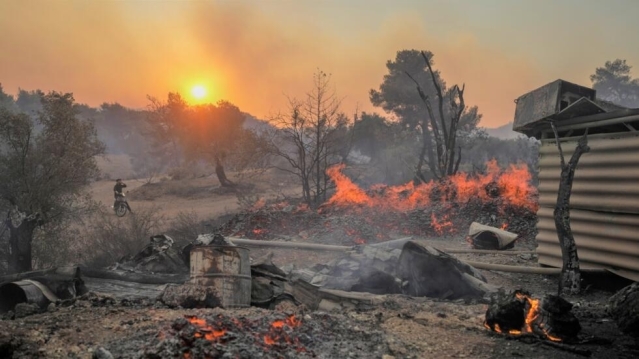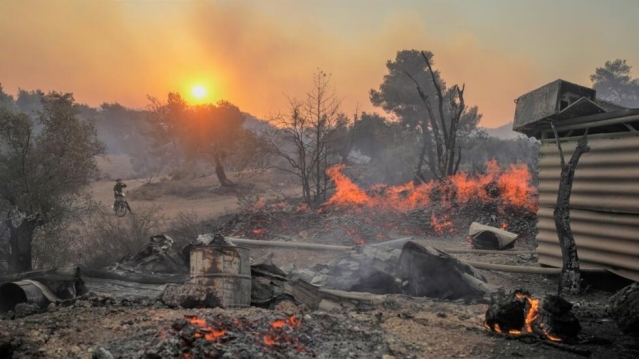
Unprecedented Greece wildfires force mass evacuations

By Anders Lorenzen
The tragic and unprecedented wildfires in many parts of Greece seem to have no end in sight as they escalated on Sunday and have now burned for a week – painting the country as a key climate battleground in Europe.
The wildfires began on the 17th of July, and forecasters are warning that the heatwave currently engulfing the country is set to be the longest in history and last 16-17 days and the hottest July in 50 years.
Status quo it is still the popular holiday destination, the island of Rhodes that is the worst impacted with the fire department saying at least 19,000 people have been evacuated from the island.
A perfect recipe
This weekend was the hottest in 50 years in Greece with temperatures reaching 45 degrees C. These hot, dry and windy conditions are the perfect recipes for wildfires.
Greek firefighting teams, assisted by international partners, have worked tirelessly to contain the wildfires. Still, the ongoing challenges faced by firefighting teams persist. Unpredictable weather conditions, strong winds, and steep terrains continue to pose obstacles in effectively combating the fires. The dedication and bravery of the firefighting personnel and the unwavering support of the local communities and international partners remain instrumental in meeting these challenges head-on.
The overstretched authorities have been helped by volunteers and organisations aiding the efforts of providing emergency shelters, food, and medical assistance to those displaced by the fires. The people of Greece have won international praise for their resilience and solidarity and the international community have played a vital role in supporting the affected individuals and communities.
The damage
Even though the fires are still ongoing and it will be a while before the full impacts are known, already now it is certain that the damage to the environment and the economy is huge.
The environmental damage caused by the Greece wildfires is vast. Extensive areas of forestland, natural habitats, and farmlands have been ravaged, leading to long-term ecological consequences. The loss of biodiversity and disruption to fragile ecosystems necessitates conservation efforts and sustainable initiatives to restore and protect the affected areas.
The Greek government has pledged to provide financial support, resources, and infrastructure rehabilitation to aid affected communities in rebuilding their lives, but this will not be enough and the country will be seeking financial support from the European Union (EU) and other international entities to ensure the timely and efficient restoration of the affected areas.
Climate models indicate these are the kind of events we will expect to see in the future as climate change takes hold, but it has still happened faster than climate science predicted – indicating that climate models are indeed conservative and the impacts will be far worse than what is predicted in climate models and reports. The debate about how such future events can be avoided will be thoroughly debated. While much can be done in building different and changing how the public behaves in such conditions will have an impact, scientists and climate advocates will argue that the best way to avoid the severity of such events is to on a global scale cut emissions much faster than is currently the trajectory.
So far one person has died and 20 injured as a direct result of the wildfires.